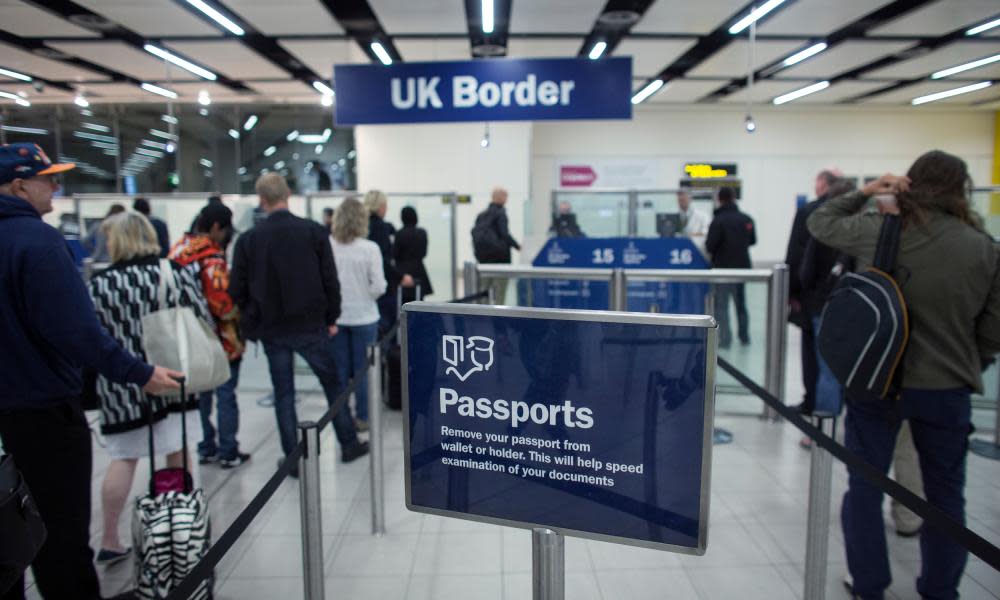Home Office admits it is struggling to recruit staff to register EU nationals

Home Office officials have privately admitted the department is having problems increasing its immigration staffing levels as part of its Brexit preparations and may have to recruit Polish and other eastern Europeans to help register the 3 million EU nationals in Britain.
Immigration lawyers said UK visas and immigration officials had told a recent business immigration conference that they faced a particular problem in “enticing staff to move to Sheffield, the city having been designated as the global processing centre”.
The disclosure comes as the immigration minister, Brandon Lewis, is to be questioned on Tuesday by the Commons home affairs select committee on the capacity of the Home Office to register the 3 million EU nationals in Britain and to implement the immigration system post-Brexit.
Amber Rudd, the home secretary, has already told MPs that 700 extra immigration caseworkers have been recruited and hopes to recruit an extra 500 by next April. The Home Office said it would be looking to recruit extra staff in the coming years.
But immigration lawyers in written evidence to the Commons select committee said even this level of extra staffing fell far short of the needed capacity, leaving each caseworker responsible for 1,500 of the 3 million EU registration applications.
They added that if EU nationals were required post-Brexit to join the “rest of the world” queue at airports, the Border Force would also require significant extra numbers to avoid “unprecedented hold-ups that could damage the UK’s reputation on a global level”.
Immigration lawyers also fear without a “seamless and simplified” new registration system there will be a repetition of the kind of errors that wrongly led to 100 EU nationals being asked to leave the country in the summer, with bank accounts being wrongly shut down and legal UK residents being asked to leave the country.
The Home Office’s difficulties in “enticing staff to move to Sheffield” affect the hub that handles visa applications for work permits, student visas, premium services and family cases.
Casework jobs outside London have been advertised at between £23,330 and £26,831 but lawyers said a recent decision to move assessments of applications from regional hubs around the world to Sheffield had added to the problems. The solicitors McGill & Co said in October that long delays were being faced by a large number of people whose visa applications were being considered.
Citizens’ rights are the rights and protections offered to all EU citizens, including free movement and residence, equal treatment and a wide range of other rights under EU law regarding work, education, social security and health.
They are held by some 3.5 million citizens from other member states in the UK and about 1.2 million British nationals on the continent, and are a key part of the negotiations that are taking Britain out of Europe.
More from the Brexit phrasebook
“As applications in more and more different visa categories are being diverted to Sheffield, applicants are starting to face increasingly unacceptable delays in receiving a decision on their applications within normal timeframes. These delays are affecting applicants from both in and out of the UK,” added McGill.
The Home Office said European casework was carried out in Liverpool, not Sheffield, where it said it was facing no recruitment problems. An extra 200 staff were recruited earlier this year to deal with the surge in applications for permanent residence from EU nationals and it said applications from the resident workforce were extremely high.
But the Home Office also acknowledged that the jobs were not “UK restricted” and so were open to EU nationals including Polish and other eastern Europeans.
“UK Visas and Immigration continues to perform efficiently and to high standards despite increasing demand for visas and immigration documents, thanks to the increased digitisation of our processes,” said a Home Office spokesperson.
“The Home Office recruits on merit, not nationality, and we strive to have a workforce that is reflective of the public we serve. We’ve been clear that we want EU citizens living in the UK to stay and to continue playing their important part in our culture, communities and companies, including here at the Home Office.
“Applying for settled status will be a streamlined, low-cost, digital process and we will have the workforce required to continue delivering a high-quality service for customers,” it added.
The results of a survey of 250 employers presented to the Immigration Law Practitioners’ Association’s AGM on Saturday found that 39% of respondents had reported a loss of staff who were European Economic Area (EEA) nationals, 47% had reported a decrease in applications from EEA staff and 13% had increased their sponsorship of non-EEA workers.
The home secretary has promised “by late autumn” to publish a white paper setting out her proposals for a new immigration system to cover new EU migrants after Brexit. The white paper, which has already been delayed, is to lay the basis for next year’s Brexit immigration bill.

 Yahoo News
Yahoo News 
